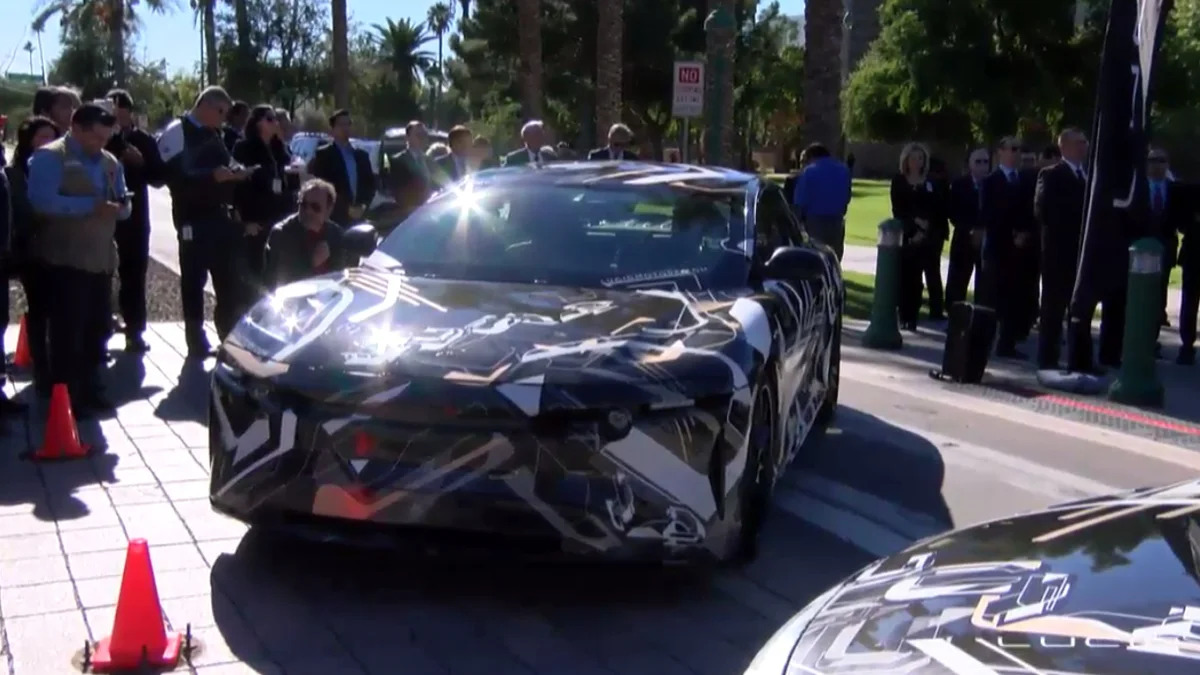It's not a long ago the Korean electronics giant Samsung announced a major deal to acquire the American electronics brand Harman Industries, to gain access to Harman's vehicle technology. Now Samsung is advancing again with its vehicle plans, as the California-based electric vehicle startup Lucid Motors has announced it is to partner with Samsung SDI. Samsung will supply Lucid with lithium ion battery cells.
Lucid Motors' upcoming vehicle is set to be unveiled next week, on December 14, and it has been seen testing still disguised in camouflage. Production is scheduled to begin in late 2018, and the executive sedan will most likely bear a name in the near future. In late November, Lucid announced their new, $700 million manufacturing plant will be built in Casa Grande, Arizona. Lucid plans to initially produce 10,000 vehicles per year and create 2,000 new jobs by 2022, focusing on employing veterans; later on, the factory should be able to produce as much as 60,000 cars per year. There has been talk of the new vehicle having either a 300-mile range and 1,000 horsepower with its 100-kWh battery pack, or a 400-mile range with a 130-kWh pack. Even the "lesser" battery pack should offer plenty of poke, helping the vehicle reach 60 mph in just three seconds. Pricing is estimated to begin above $100,000.
The two companies, Samsung and Lucid, are said to have collaborated to produce "next-generation cylindrical cells that are able to exceed current performance benchmarks in areas such as energy density, power, calendar life and safety." Lucid says one of the most important qualities of the new battery cells is its "breakthrough" tolerance of repeated fast charging. Earlier, there have been reports of fast charging having a negative effect on EV battery life. Fast charging, however, is one of the key requirements of more widespread battery electric vehicle take-up; hydrogen cars are closer to conventional fossil fuel cars in the respect that they do not need to spend such a long time at the service station, as compared to charging up a battery electric vehicle.
"As the leading manufacturer of lithium-ion cells in the world, we are excited to be increasing our participation in automotive applications," says Samsung SDI's Vice President of Sales, J.Y. Youn. Earlier, Faraday Future has announced it will partner with Samsung's rival LG Chem to use its lithium-ion batteries; LG Chem already makes batteries for GM, Tesla and Audi.
Related Video:
Lucid Motors' upcoming vehicle is set to be unveiled next week, on December 14, and it has been seen testing still disguised in camouflage. Production is scheduled to begin in late 2018, and the executive sedan will most likely bear a name in the near future. In late November, Lucid announced their new, $700 million manufacturing plant will be built in Casa Grande, Arizona. Lucid plans to initially produce 10,000 vehicles per year and create 2,000 new jobs by 2022, focusing on employing veterans; later on, the factory should be able to produce as much as 60,000 cars per year. There has been talk of the new vehicle having either a 300-mile range and 1,000 horsepower with its 100-kWh battery pack, or a 400-mile range with a 130-kWh pack. Even the "lesser" battery pack should offer plenty of poke, helping the vehicle reach 60 mph in just three seconds. Pricing is estimated to begin above $100,000.
The two companies, Samsung and Lucid, are said to have collaborated to produce "next-generation cylindrical cells that are able to exceed current performance benchmarks in areas such as energy density, power, calendar life and safety." Lucid says one of the most important qualities of the new battery cells is its "breakthrough" tolerance of repeated fast charging. Earlier, there have been reports of fast charging having a negative effect on EV battery life. Fast charging, however, is one of the key requirements of more widespread battery electric vehicle take-up; hydrogen cars are closer to conventional fossil fuel cars in the respect that they do not need to spend such a long time at the service station, as compared to charging up a battery electric vehicle.
"As the leading manufacturer of lithium-ion cells in the world, we are excited to be increasing our participation in automotive applications," says Samsung SDI's Vice President of Sales, J.Y. Youn. Earlier, Faraday Future has announced it will partner with Samsung's rival LG Chem to use its lithium-ion batteries; LG Chem already makes batteries for GM, Tesla and Audi.
Related Video:










Sign in to post
Please sign in to leave a comment.
Continue